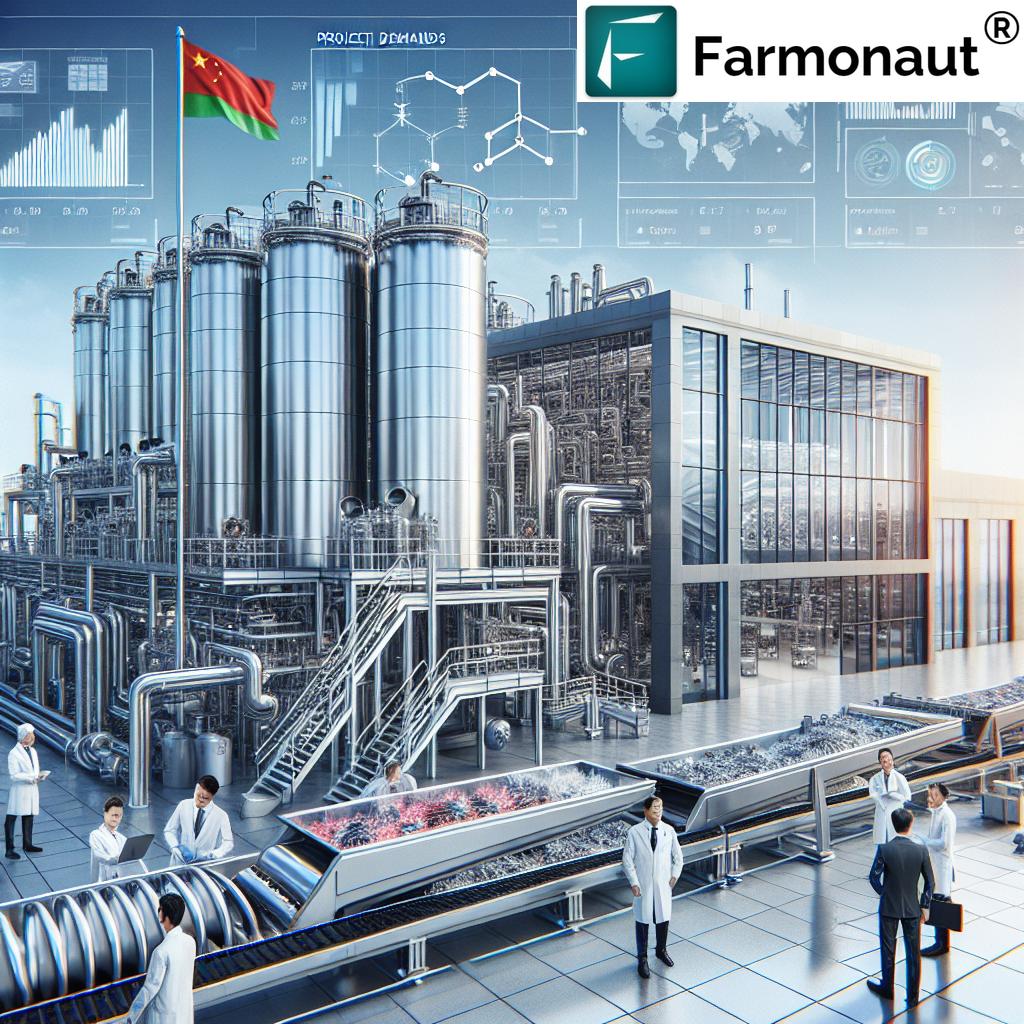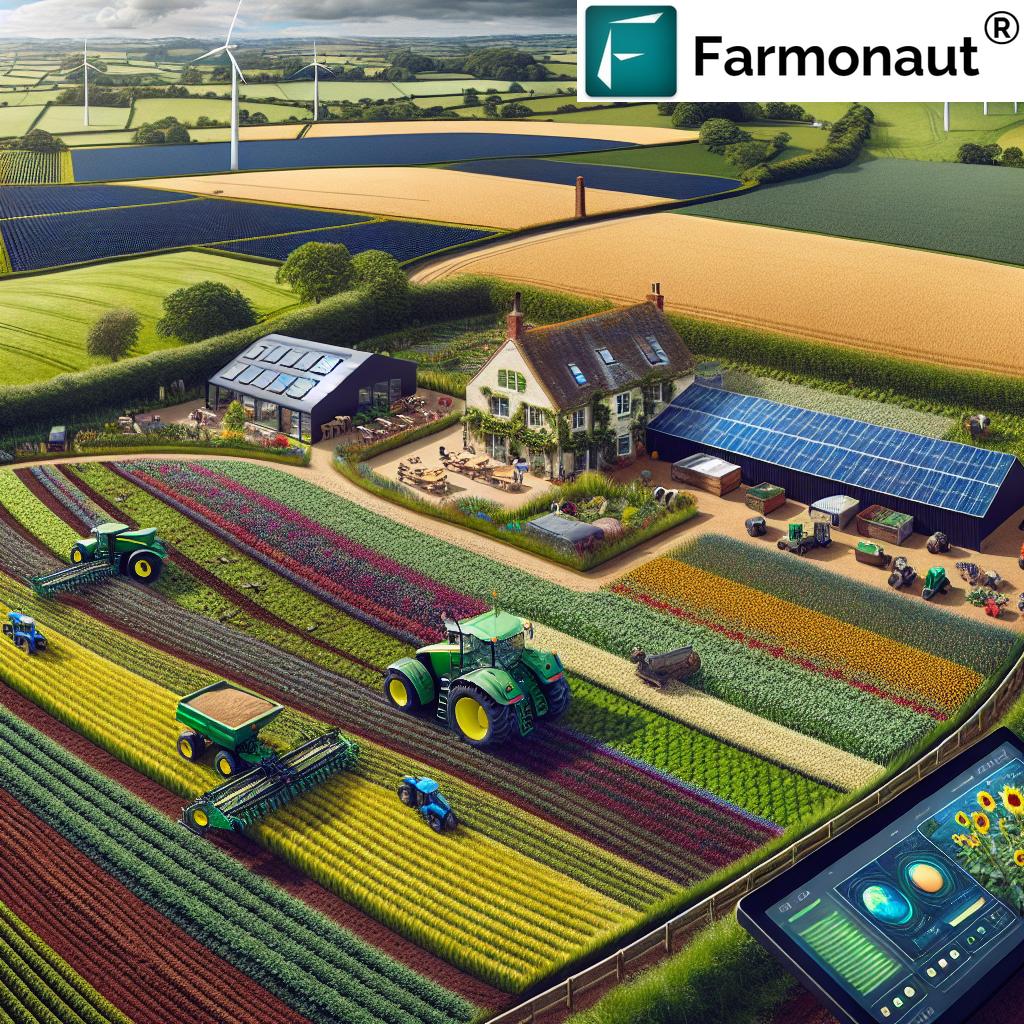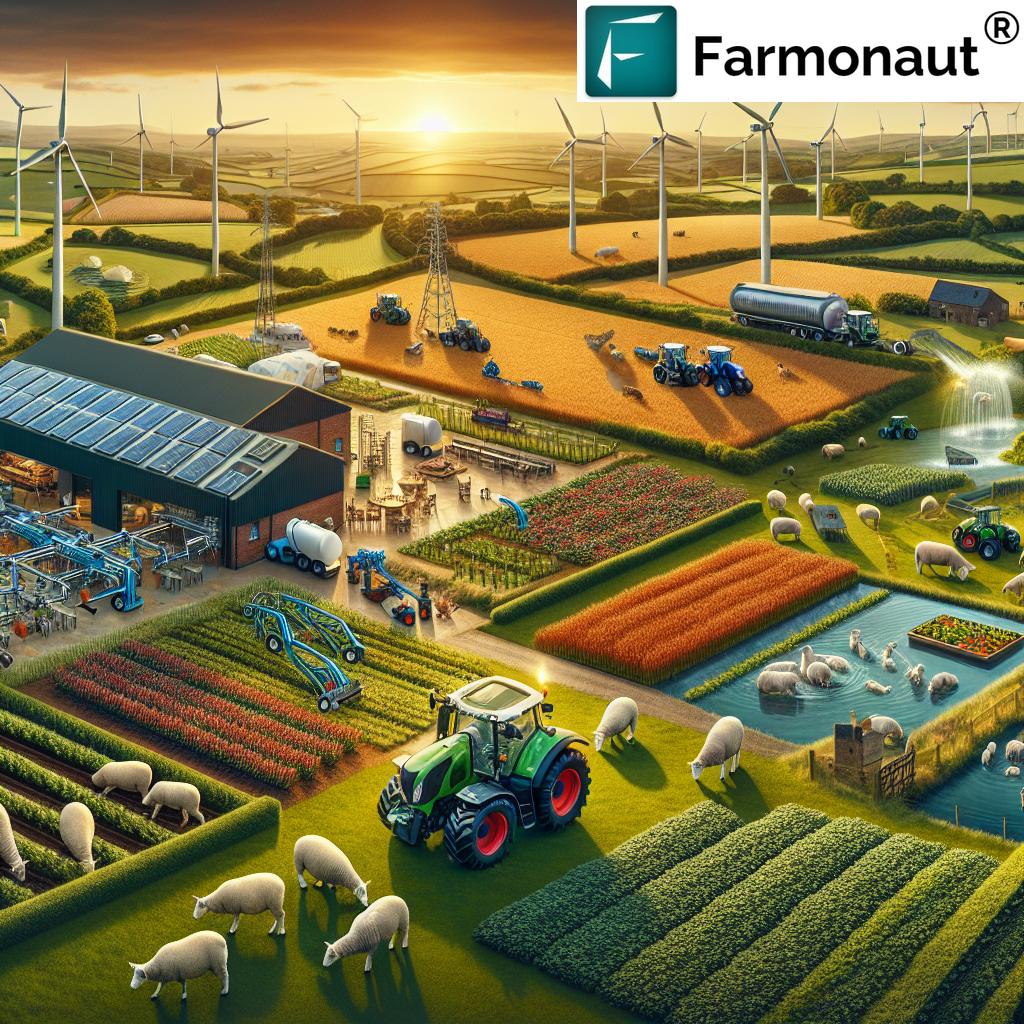UK Rural Economy: Navigating Post-Brexit Trade Opportunities and Agricultural Innovations
“The CLA’s ‘New Opportunities’ report outlines strategies for UK farms to thrive post-Brexit, covering over 10 key agricultural sectors.”
In the wake of Brexit, the UK rural economy faces a transformative period filled with both challenges and opportunities. As we navigate this new landscape, it’s crucial for farms, rural businesses, and the agricultural sector as a whole to adapt and innovate. The Country Land and Business Association’s (CLA) ‘New Opportunities’ report provides a comprehensive roadmap for rural enterprises to thrive in a post-EU world. In this blog post, we’ll explore the key strategies and innovations that can propel the UK’s agricultural sector forward, with a particular focus on how Farmonaut’s cutting-edge remote sensing and GIS technologies align with these emerging trends.
The Post-Brexit Landscape for UK Agriculture
Brexit has ushered in a new era for UK agriculture, prompting a reassessment of trade relationships, regulatory frameworks, and support systems. The departure from the European Union’s Common Agricultural Policy (CAP) has created both uncertainty and potential for growth. Let’s delve into the key areas where rural business opportunities post-Brexit are emerging:
- Trade dynamics with EU and non-EU countries
- Domestic agricultural policy and subsidy restructuring
- Environmental land management schemes
- Labor market changes and workforce development
These changes necessitate a strategic approach to farming and rural business management. The CLA report emphasizes the need for adaptability, innovation, and diversification to ensure the resilience of the UK’s rural economy.
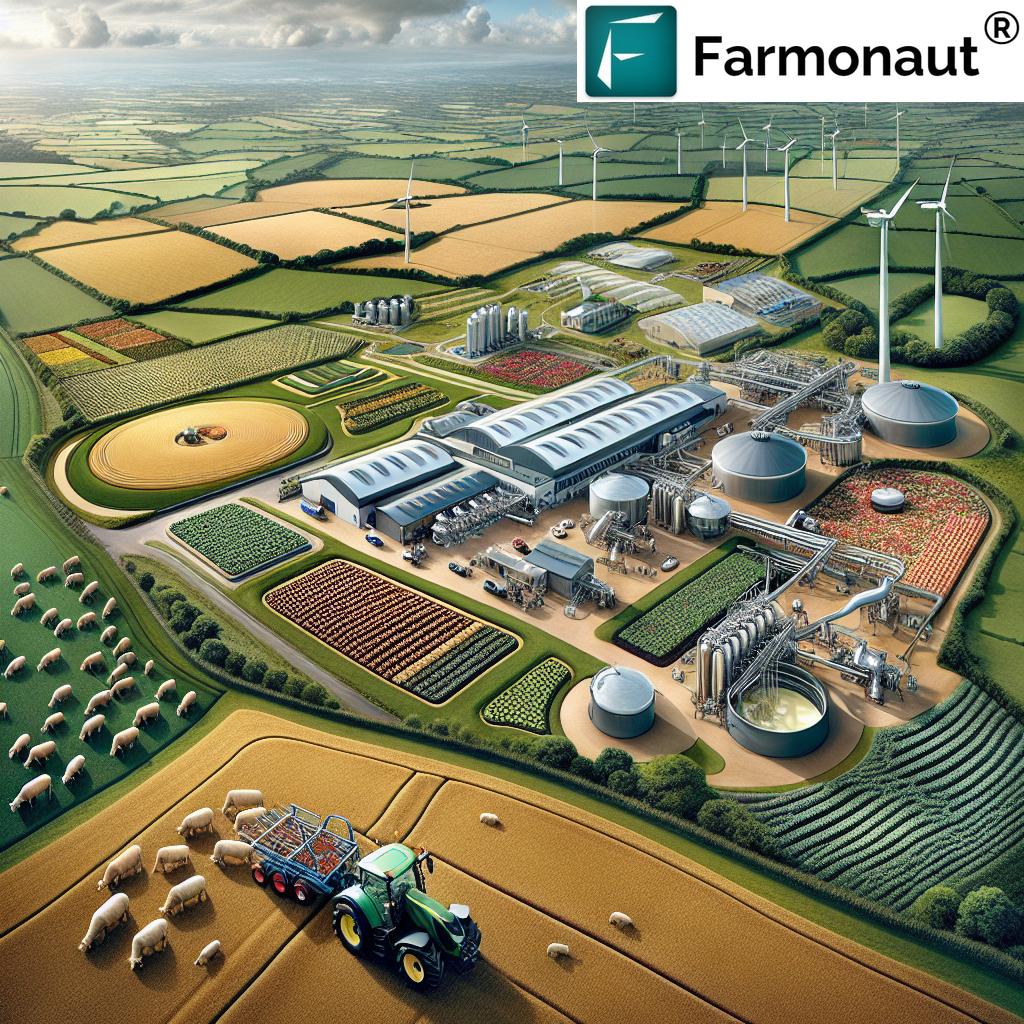
Sustainable Farming Practices: A Cornerstone of Future Agriculture
As we move forward, sustainable farming practices will play a pivotal role in shaping the future of UK agriculture. These practices not only benefit the environment but also contribute to long-term farm viability and productivity. Key areas of focus include:
- Soil health management and conservation tillage
- Integrated pest management (IPM) strategies
- Water conservation and efficient irrigation systems
- Biodiversity enhancement and habitat creation
By adopting these practices, UK farmers can improve their crop management techniques while reducing their environmental footprint. This aligns with both consumer demands for sustainably produced food and government initiatives for greener agriculture.
Agricultural Diversification: Expanding Horizons
Agricultural diversification is a key strategy highlighted in the CLA report for enhancing farm resilience and profitability. By expanding beyond traditional farming activities, rural businesses can tap into new revenue streams and spread risk. Some promising areas for diversification include:
- Agritourism and farm stays
- Value-added product development (e.g., artisanal cheeses, jams)
- On-farm renewable energy production
- Specialized crop cultivation (e.g., herbs, medicinal plants)
Diversification not only provides additional income but also helps farms weather market fluctuations and changing consumer preferences. It’s an essential strategy for building a robust and adaptable rural economy.
Precision Agriculture Technologies: Revolutionizing Farm Management
The adoption of precision agriculture technologies is transforming the way farms operate, offering unprecedented levels of efficiency and resource optimization. These technologies enable farmers to make data-driven decisions, reducing waste and maximizing yields. Key precision agriculture tools include:
- GPS-guided machinery for precise planting and harvesting
- Drone and satellite imagery for crop health monitoring
- Variable rate technology for optimized input application
- IoT sensors for real-time field condition monitoring
Farmonaut’s satellite-based farm management solutions are at the forefront of this technological revolution. Our platform provides farmers with real-time crop health monitoring, AI-based advisory systems, and resource management tools, making precision agriculture accessible and affordable.
Explore Farmonaut’s precision agriculture solutions:
UK Agricultural Trade Strategies in a Global Context
Developing robust UK agricultural trade strategies is crucial for the sector’s success in the post-Brexit era. The CLA report emphasizes the importance of:
- Negotiating favorable trade agreements with key partners
- Promoting UK agricultural products in international markets
- Developing niche markets for high-quality, specialty products
- Enhancing supply chain efficiency and traceability
These strategies aim to position UK agriculture competitively on the global stage, leveraging the country’s strengths in areas such as animal welfare standards, sustainable farming practices, and product quality.
Innovations in Crop Management and Irrigation
Advancements in crop management techniques and irrigation systems are vital for improving farm productivity and sustainability. Some key innovations include:
- Precision irrigation systems with soil moisture sensors
- AI-powered crop growth models for yield prediction
- Vertical farming and controlled environment agriculture
- Bioengineering for drought and pest-resistant crop varieties
These innovations help farmers optimize resource use, reduce environmental impact, and increase crop yields. Farmonaut’s satellite-based crop health monitoring and AI advisory system play a crucial role in supporting these advanced crop management strategies.
“UK’s agricultural sector employs approximately 472,000 people, contributing £10.4 billion annually to the national economy.”
Renewable Energy in Farming: Powering the Future
Integrating renewable energy in farming is a key focus area for rural businesses looking to reduce costs and improve sustainability. The CLA report highlights several opportunities:
- Solar panel installations on farm buildings and unused land
- Wind turbines for on-farm electricity generation
- Anaerobic digestion of farm waste for biogas production
- Biomass boilers for heating farm buildings and greenhouses
By adopting renewable energy solutions, farms can reduce their carbon footprint, lower energy costs, and potentially create additional income streams through energy sales to the grid.
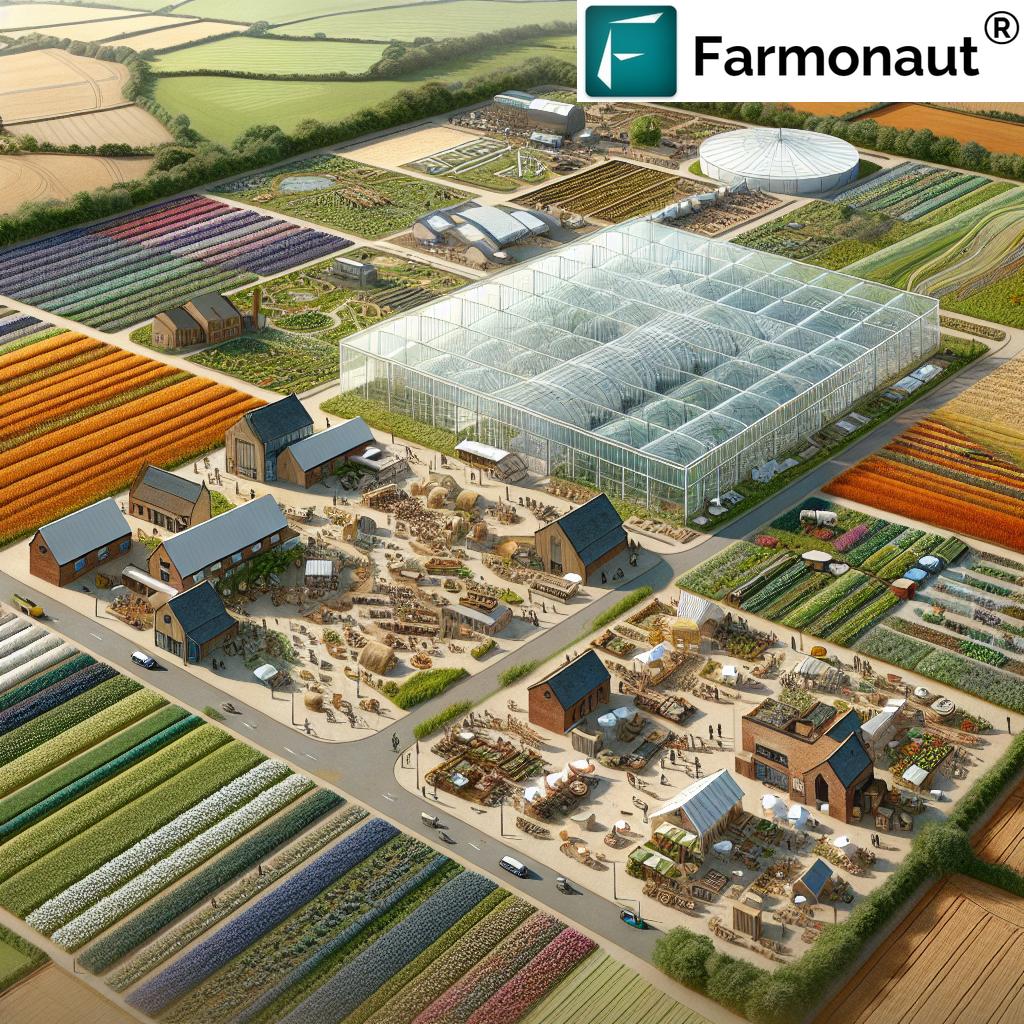
Farm Equipment and Machinery: Modernizing for Efficiency
Investing in modern farm equipment and machinery is essential for improving productivity and efficiency in UK agriculture. The CLA report emphasizes the importance of:
- Precision farming equipment with GPS and variable rate technology
- Autonomous tractors and robotic systems for field operations
- Smart storage solutions for improved post-harvest management
- Efficient irrigation systems for water conservation
These technological advancements not only increase farm productivity but also contribute to more sustainable farming practices by optimizing resource use.
Agricultural Finance Solutions: Fueling Growth and Innovation
Access to appropriate agricultural finance solutions is crucial for implementing the strategies outlined in the CLA report. Key financial tools and services include:
- Specialized farm loans for equipment upgrades and diversification projects
- Risk management products such as crop insurance and weather derivatives
- Green finance options for sustainable farming initiatives
- Government-backed grants and subsidies for rural development
Farmonaut’s satellite-based verification services for crop loans and insurance play a vital role in improving farmers’ access to financial products while reducing risks for lenders.
Leveraging UK’s Strengths in Specialized Agricultural Sectors
The UK has several specialized agricultural sectors that can be leveraged for competitive advantage in the global market. These include:
- Forestry: Sustainable timber production and carbon sequestration
- Grassland management: High-quality livestock production and biodiversity conservation
- Organic farming: Meeting growing consumer demand for organic products
- Beekeeping: Supporting pollination services and producing high-value honey products
By focusing on these areas of expertise, UK farmers can differentiate their products and tap into premium markets both domestically and internationally.
Rural Economy Innovation: Embracing Digital Technologies
Rural economy innovation is key to ensuring the long-term viability of UK agriculture. The CLA report emphasizes the importance of digital adoption in various aspects of farm management:
- E-commerce platforms for direct-to-consumer sales
- Farm management software for streamlined operations
- Blockchain technology for supply chain traceability
- Big data analytics for market trends and price forecasting
Farmonaut’s platform aligns perfectly with these innovation trends, offering farmers powerful digital tools for optimal land management and crop yield optimization.
Explore Farmonaut’s API for custom agtech solutions:
Farmonaut API
API Developer Docs
Comparison Table: UK Agricultural Sector Adaptation Strategies Post-Brexit
| Strategy | Description | Potential Impact | Implementation Difficulty |
|---|---|---|---|
| Sustainable Farming Practices | Adopting environmentally friendly farming methods | High | Medium |
| Agricultural Diversification | Expanding into new products or services | High | Medium |
| Precision Agriculture Adoption | Implementing data-driven farming technologies | High | High |
| Renewable Energy Integration | Incorporating renewable energy sources on farms | Medium | Medium |
| Farm Equipment Modernization | Upgrading to more efficient and advanced machinery | Medium | High |
The Role of Farmonaut in UK Agricultural Innovation
Farmonaut’s advanced satellite-based farm management solutions are playing a crucial role in supporting the UK’s agricultural innovation efforts. Our technology aligns perfectly with the strategies outlined in the CLA report, offering farmers powerful tools for:
- Real-time crop health monitoring
- AI-powered advisory systems for precision farming
- Resource management and optimization
- Blockchain-based traceability solutions
By leveraging Farmonaut’s technology, UK farmers can make data-driven decisions, improve productivity, and adapt more effectively to the changing agricultural landscape post-Brexit.
Challenges and Opportunities for UK Farms
While the post-Brexit landscape presents numerous challenges for UK farms, it also offers significant opportunities for growth and innovation. Some key challenges include:
- Adapting to new trade agreements and market conditions
- Meeting evolving environmental and animal welfare standards
- Addressing labor shortages in the agricultural sector
- Investing in new technologies and skills development
However, these challenges also create opportunities for farms to:
- Develop niche, high-value products for domestic and international markets
- Improve efficiency through technology adoption and sustainable practices
- Diversify income streams through agritourism and value-added products
- Collaborate with research institutions for innovation in crop and livestock management
The Future of UK Rural Economy: A Vision for Prosperity
As we look to the future, the UK rural economy has the potential to thrive by embracing innovation, sustainability, and diversification. Key elements of this vision include:
- A network of technologically advanced, sustainable farms
- Thriving rural communities with diverse economic activities
- Strong links between urban and rural areas for food security and environmental stewardship
- UK agriculture as a global leader in sustainable and high-quality food production
By implementing the strategies outlined in the CLA report and leveraging cutting-edge technologies like those offered by Farmonaut, the UK agricultural sector can build a resilient and prosperous future.
Conclusion: Embracing Change for a Thriving Rural Economy
The post-Brexit era presents both challenges and opportunities for the UK rural economy. By embracing sustainable farming practices, agricultural diversification, and cutting-edge technologies, farms and rural businesses can not only survive but thrive in this new landscape. The CLA’s ‘New Opportunities’ report provides a valuable roadmap for navigating these changes, emphasizing the importance of innovation, adaptability, and strategic planning.
As we move forward, the integration of advanced technologies like Farmonaut’s satellite-based farm management solutions will play a crucial role in driving efficiency, sustainability, and profitability in UK agriculture. By leveraging these tools and embracing the strategies outlined in this blog post, UK farmers and rural businesses can position themselves for success in the global marketplace while contributing to a more sustainable and prosperous rural economy.
The future of UK agriculture is bright, filled with opportunities for those willing to innovate and adapt. Let’s embrace this new era of farming with optimism, creativity, and a commitment to sustainable growth.
FAQs
- How has Brexit impacted UK agriculture?
Brexit has led to changes in trade relationships, subsidy structures, and regulatory frameworks for UK agriculture. While it presents challenges, it also offers opportunities for new trade deals and domestic policy reforms. - What are the key strategies for UK farms to thrive post-Brexit?
Key strategies include adopting sustainable farming practices, diversifying agricultural activities, embracing precision agriculture technologies, and developing niche markets for high-quality products. - How can precision agriculture benefit UK farmers?
Precision agriculture technologies, like those offered by Farmonaut, can help farmers optimize resource use, improve crop yields, reduce environmental impact, and make data-driven decisions for better farm management. - What role does agricultural diversification play in the rural economy?
Diversification helps farms spread risk, create additional income streams, and adapt to changing market conditions. It can include activities like agritourism, value-added product development, and renewable energy production. - How can UK farmers access financial support for innovation and growth?
Farmers can access support through specialized farm loans, government grants, green finance options, and risk management products. Farmonaut’s satellite-based verification services can also help improve access to financial products.




